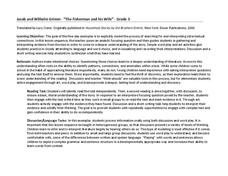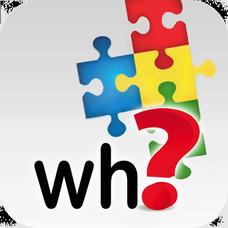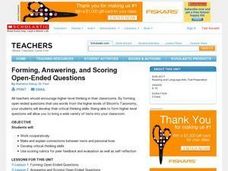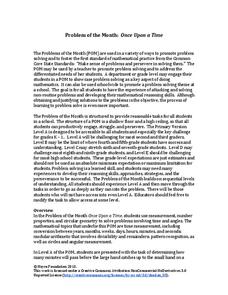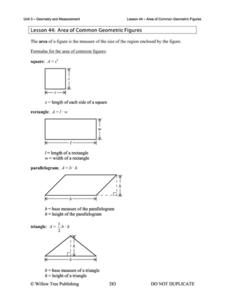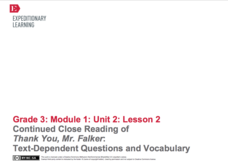Curated OER
The Fisherman and His Wife
Engage conversation and explore the journey as you challenge young readers to interpret the german folktale, "The Fisherman and His Wife" written by literary brothers Jacob and Wilhelm Grimm.
John Talavera
Autism iHelp – WH Questions
Who, what, when, where, and why questions are often the questions that teachers use to foster engagement, verbal communication skills, higher-order thinking, and hopefully, a deeper understanding of the world. This tool is geared toward...
Curated OER
Developing Open-Ended Questions
Students work in groups of two to develop questions and sample answers that are relevant, accurate and use higher level of thinking skills about a literary unit. Students present their questions and answers to the class as a review of...
Curated OER
Forming, Answering, and Scoring Open Ended Questions
Young scholars explore higher level thinking. They develop their critical thinking skills by answering open ended questions. Students work cooperatively and make and explain connections between texts and their personal lives. Young...
Novelinks
Wildwood Dancing: Questions using Bloom’s Taxonomy of Thinking Process
Readers respond to a series of questions focused onJuliet Marillier's young adult novel Wildwood Dancing, and crafted to reflect the levels in Bloom's Taxonomy.
Noyce Foundation
Once Upon a Time
Examine the relationship between time and geometry. A series of five lessons provides a grade-appropriate problem from elementary through high school. Each problem asks learners to compare the movement of the hands on a clock to an angle...
Willow Tree
Area of Common Geometric Figures
Scholars can use area formulas, but can they apply what they know about area? The lesson plan challenges learners to think logically while practicing finding area of shapes such as rectangles, circles, parallelograms, triangles, and...
BioEd Online
Skeletal Structures
What better way to study the structures of organisms than by creating a new being? After considering different types of skeletal supports (exoskeleton and endoskeleton), budding biogeneticists work together to create their own animals -...
BioEd Online
Muscles and Bones in Space
Being an astronaut takes not only high mental acuity, but also a high level of physical fitness, especially for those who spend a long amount of time away from Earth, such as the astronauts serving on the International Space Station....
MENSA Education & Research Foundation
Pi Day Fun!
In this multi-faceted introduction to pi, participants perform a bevy of pi-related activities. Ranging from measuring household items to singing pi songs and reading pi stories, this fun and non-intimidating resource serves to bring up...
Oregon Museum of Science and Industry (OMSI)
DNA Extraction
What does your DNA actually look like? Use simple materials with this experiment to find out! Geneticists of all ages can follow these instructions to extract their own DNA. For learners who are hoping to extend the activity, there are...
Curated OER
Teaching Students Mathematical Reasoning Skills
Students can build upon their basic math skills and become higher order thinkers when we encourage the following principles.
Curated OER
Themes vs. Timelines
Teaching history through a thematic curriculum fosters a higher level of engagement and critical thinking in young historians.
Benjamin Franklin High School
Saxon Math: Algebra 2 (Section 1)
This first of twelve algebra 2 resources provides a broad review of many algebra 1 concepts through a number of separable lessons and labs. Starting with the real number system and its subsystems, the sections quickly but thoroughly move...
College Board
2015 AP® Physics 2: Algebra-Based Free-Response Questions
As one of the few AP tests that count for second year college course credit, the AP Physics 2 exam requires a higher level of knowledge than most. Help young scientists study for their upcoming AP Physics 2 exams with previous...
Curated OER
Alice's Adventures in Wonderland and Through the Looking-Glass Theme of Exploration
Guide your learners to develop themes in Lewis Carroll's Alice’s Adventures in Wonderland and Through the Looking Glass. Here is a handy resource that poses abundant higher-level thinking questions on topics in the books from...
Curated OER
Ser
There is only one question posted here, but consider pairing it with a question that requires some higher-level thinking and present it to your class as a bell-ringer. The pupil simply has to choose the correct word (son, estamos, or...
Curated OER
Story Map for Crime and Punishment Part I, Chapters 1-5
While reading chapters one through five of Crime and Punishment, focus your readers with this guide. Eight questions are given here, encouraging the reader to study the protagonist and the struggles that ensue with the surrounding...
Curated OER
Of Mice and Men: Chapter 2 Reading and Study Guide
Provide your class with this reading guide for chapter two of Steinbeck's Of Mice and Men. They grapple with new vocabulary words like swamper, cesspool, and mollified before checking out literary terms and answering a list of questions...
Curated OER
Extinction Trade Questions
There are many ethical and moral issues surrounding critically endangered species. Use these higher-level thinking questions to help high schoolers examine ecological, socioeconomic, and political scenarios about human impacts on...
Polk Bros Foundation
I Can Comprehend a Paragraph, then a Page/Section in a Text
Help your class tackle chunks of text with a simple graphic organizer. Pupils read three paragraphs and, as they read, draw pictures in the provided boxes that demonstrate what each paragraph says. There are three boxes on the page and...
EngageNY
Continued Close Reading of Thank You, Mr. Falker: Text Dependent Questions and Vocabulary
In the second lesson plan in a series that revolves around the story, Thank You, Mr. Falker, learners practice the skill of answering direct questions from the text while using complete sentences. After a teacher-led review of how to...
Curated OER
Using Bloom's Taxonomy in Science
Help your students internalize knowledge by creating activities that utilize higher level thinking skills.
Curated OER
The Book Thief: Discussion Questions
Expand your study of The Book Thief by Markus Zusak with a question for each level of Bloom's Taxonomy. These questions focus on part four of the novel; each is paired with at least one quote from the text for context and teacher reference.


